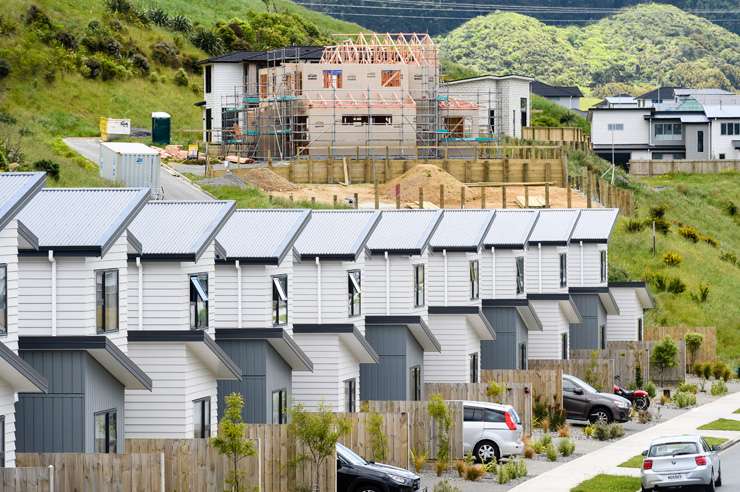High investor activity in Wellington contributed to the rise in the market in the capital during the Covid boom but has also contributed to the decline since, says James Wilson, director of valuation for OneRoof’s data partner Valocity.
Wellington has always seen high investor activity because of good rental yields but there was a surge of activity off the back of the Covid boom, Wilson says.
Auckland investors contributed to price rises, along with investors from other parts of the country such as Hamilton and the wider Waikato, but investors overall have since pulled back in Wellington.
Start your property search
Wilson says investors in Auckland, for example, often take equity out of assets in Auckland in order to buy elsewhere in the country.
“What sometimes occurs is that people say ‘look, I’ve got my asset in Auckland and it’s worth $2m. I’m going to refinance against that and I’m going to put that money into purchasing another property in Wellington.’”
They decide they have a set dollar amount they can spend then go and look for a property at their price point, Wilson says.
But when the asset in Auckland declines, rather than deciding to spend a certain percentage less on their next property than they would have spent a year earlier, some might decide to spend a dollar amount less, such as $100,000.
“When you put $100,000 as a percentage in Wellington compared to, say, Auckland it's a bigger percentage decrease in markets like Wellington – it’s called the dollar amount investing as opposed to looking at purely percentage change in value.
“They go ‘right, what I would have spent $1.5 million on last year I now spend $1.4 million on’, and the market then comes down to that level.”
Wilson says Valocity is often asked why Wellington is softening faster than other markets and says it’s not because the Wellington market has fallen apart and the rest of New Zealand has not.
“It’s just that some of those groups like investors have been using equity out of other markets and the pullback effect of that can be a bit more significant.
“That's one of the reasons why local market conditions are showing Wellington as softening faster than other markets because the out-of-town investors are being more cautious than they were this time last year.”
There’s no evidence to show Aucklanders are more responsible for that than other investors but Wilson says a lot of equity is taken out of markets like Auckland to invest in markets like Wellington.
“It's not that they are selling their stock and pushing the market down, it's that they're being more cautious and therefore aren't as active in the market which is contributing to the overall softness, and that in turn impacts value.”
On the ground in Wellington, Nikki Cruickshank, principal with Tommys Real Estate, doesn’t think investors made much difference to the rise of prices in Wellington and have made only had a minimal impact on the fall.
“We survey our buyers every month end and right through last year, even during the height of the market and stuff, it was mainly local buyers, not out of town buyers.
“There's always an element of Auckland investors in terms of people a lot of the time buying for their children for university but that's not a very big percentage, it's just a small, small percentage of the market.

Valocity head of valuations James Wilson: “Out-of-town investors are being more cautious than they were this time last year.” Photo / Fiona Goodall
“The major impact is people were paying too much and borrowing at 2.5% and now they can't borrow the money and the interest rates are a lot higher so they are more circumspect and careful.”
Cruickshank says locals impact the Wellington market the most and that happened with FOMO (fear of missing out) after Covid – “if you want to blame anyone it was the Government having interest rates at 2.5%.
“That made a lot of people borrow a lot of money. It's easier to pay more money for a house when you're not paying nearly as much interest so that was more the contributing factor than anything.”
Now interest rates have gone up the demand is not at the same level, but the level was too high anyway, she says.
“That's why the market is a lot steadier now and that will continue to be the case until interest rates start to come down again which probably won't be until the end of next year.”
Grant Henderson, residential general manager for Bayleys Wellington, thinks the biggest driver of the market during the boom was developers, especially in the Hutt Valley which he says has had the biggest value drop across the city.

New builds under construction in Wellington at the end of 2020. New homes have proved popular with investors. Photo / Getty Images
Developers paid some “incredibly big money” buying up two state houses on 700sq m flat sections to make a 1400sq m site then putting up 12 to 15 townhouses or building three storey properties.
“For example, one that would have sold for normally $700,000 all of a sudden developers were offering them $1m to $1.2 million, so that raised the average price quite high then what that did was that filtered down to the sales stats and everything looks like it was worth a whole lot more money.
“When you pull that all apart and look at those sales they went to people that were purchasing for the purpose of development.”
First home buyers bought some of those properties, as well investors and flippers, Henderson says.
Investors were attracted because they were brand new builds and exempt from the interest rate tax deductibility removal rules, and also because there was likely to be capital gain between the time of purchase and settlement.
“The difficulty with that now is if you purchased two years ago, or even a year ago, off plan we've had some properties that valuers are now saying they're down 15% on what the purchase price was.
“In some cases it's even more than that so some people will end up with either negative equity or houses that are going to have to settle on that are worth less than what they paid for them.”
Auckland investors bought mainly off plan, and most investors left the market after the new interest rate rules were announced.
Henderson says the market fall was down to the cumulative effect of a number of things happening at once.


















































































